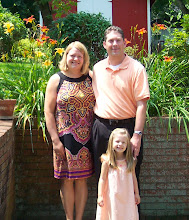There's a lot of information out there in the psychological community about why young children lie. I came across a recent article here. Most professionals will tell you that children don't lie on purpose, they are just being "creative" and promoting their own "reality." If faced with an uncomfortable situation like being accused (rightfully) of breaking something, they will convince themselves that they didn't do it as a defense mechanism. Professionals will tell you that this is not malicious, but just a developmentally appropriate thing for 3-yr-olds to do. Ironically, this psycho-babble is a lie in itself. It is a desperate attempt for the psychological community to reinforce the misconception that children are basically good and innocent.
Here's the truth: according to Proverbs 13:22, "Lying lips are an abomination to the Lord, but those who deal truthfully are His delight."
Since the fall of mankind in the Garden of Eden, the heart of man has been sinful. It is natural (i.e. "developmentally appropriate") for kids to lie because the heart of mankind is sinful. How parents and caregivers choose to deal with the lying will either teach the children how to honor God with their honesty OR reinforce the habit of lying.
Psychologists recommend that parents not accuse the child of lying. It might hurt their self-esteem! Instead, parents should help the child right the wrong (clean up the mess, make restitution, etc.) without specifically addressing the lying. If, however, the child admits their guilt without lying, they should be praised and the consequence should be lessened or elimiated altogether. What a mixed message this sends to children! Why should we be afraid to confront the issue of lying? Children need clear messages and clear teaching. If lying is an "abomination to the Lord" it should be clearly taught to our children that lying is sinful and will be dealt with in a disciplinary manner. Of course, all discipline should be done in the spirit of love and obedience to God's commands. (See this post and this post for more information on discipline.)
Another issue raised in the psychological community is that focusing on lying stifles a child's creativity. There are plenty of opportunities for kids to develop their creativity without lying or telling stories that make people believe something that never happened. If a child enjoys telling wild tales, we should encourage them to act out their "pretend" stories with toys or write fictional stories. We should not, however, go along with obviously false stories by providing an emotional reaction (laughter, amazement, pretending to believe the story, etc.). This reinforces the behavior and encourages the child to exaggerate stories to get positive attention from other people.
Above all, the best way we can teach our kids about honesty is to be honest ourselves. I will admit that I love to tell a good story. Sometimes I find myself exaggerating just to make my point. While writing this blog post, I have been convicted that I need to watch myself and be honest in all my dealings and storytelling. Grace is only three years old, but she watches and listens to everything I do. What a great responsibility we bear as parents!
Friday, October 24, 2008
Subscribe to:
Post Comments (Atom)




















3 comments:
Psalm 58:3 says "The wicked are estranged from the womb; they go astray as soon as they are born, speaking lies." Yes, we need to lovingly discipline our children to "lay aside falsehood, and speak truth" (Eph. 4:25). Good post!!
I just read the "16 rules of Susanna Wesley" the other day, and #8 was this: To prevent lying, punish no fault which is first confessed and repented of.
I thought about that, and I do want to prevent lying, but I also can't NOT punish Brad for hitting Anne just because he was honest and admitted hitting her. Then he'll think he can hit her whenever he wants and avoid trouble just by telling me about it.
So what I've been doing recently when he tells me the truth about something (that I didn't see, that he could lie about), is tell him, "Thank you for telling me the truth. I'm going to give you x number of spanks for doing x, but I won't give you any for lying."
Thoughts on Susanna's rule and my modification? Any advice on this?
I think you are wise, Mrs. Sprinkles. Just because a child admits wrongdoing does not mean we should not follow through with biblical discipline. When our kids do confess their wrongdoing (instead of lying), we should encourage them that this is the first step in making ourselves right with God. Hey, it works for Alcoholics Anonymous, too, right? Because after admitting they have a problem, they still must follow through the remaining steps!
Post a Comment